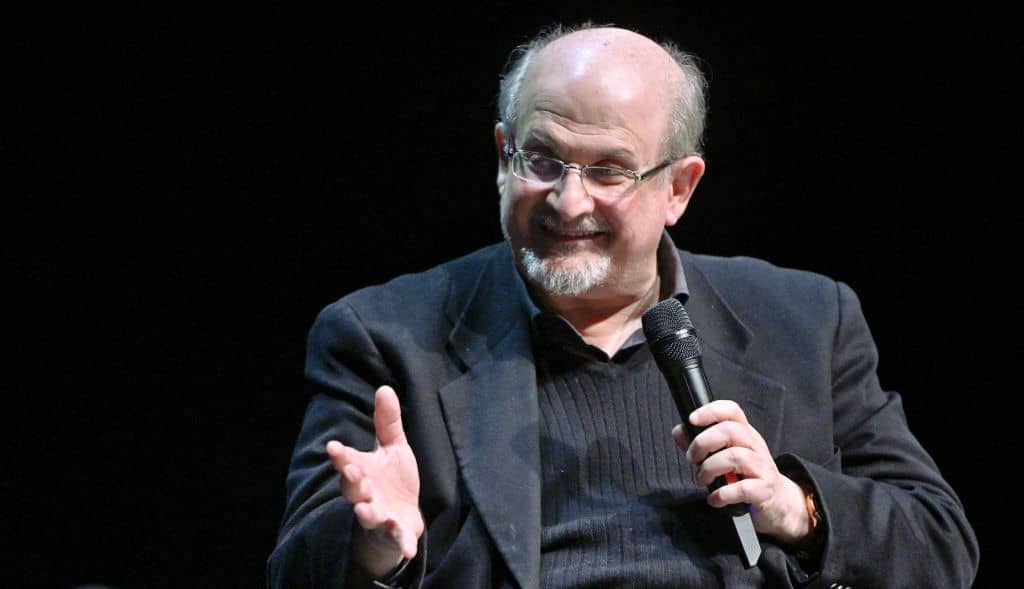The attack on Salman Rushdie on-stage in New York is deeply shocking and sadly not surprising. People have been calling for his death for over three decades, ever since the publication of his 1988 novel The Satanic Verses. That novel led to a fatwa from the Ayatollah Khomeini of Iran and the Iranian government putting a bounty on the British author´s head. They were encouraged in this by Muslim leaders in Britain. The repercussions for Rushdie were swift.
Rushdie himself went into hiding, protected by the security services of the British state at the behest of Margaret Thatcher´s government. He stayed in hiding for many years, during which time there were numerous attempts on his life, including from an Iranian agent who blew himself up in London. The novel´s Japanese translator – Hitoshi Igarashi – was stabbed and killed. The Norwegian publisher of the novel was shot outside his home in Oslo.
Then, during the years of the last Labour government in Britain, a compromise of a kind appeared to have been reached. The Iranian government said they would no longer encourage attacks on Rushdie but nor would they impede them. Later they changed tack again saying that the fatwa remained in place. Various scholars said that it wouldn´t matter anyway, because the only person who could rescind the fatwa was the person who had issued it, and he was dead.
What happened in New York today cannot be allowed to win. The illiterate cannot be allowed to dictate the rules of literature
Nevertheless, in recent years Rushdie has been able to come out of hiding and lead what seemed like a comparatively normal life. He has appeared at public events, and the last time I saw him I was struck by the fact that he seemed to be moving around like anyone else. But clearly the threat never went away. There are plenty of radicalised Muslims in America as there are in Britain who do not need a late Ayatollah´s word to try to institute Islamic blasphemy laws in our societies. In 1989, crowds in Bradford were allowed to burn the novel and call for Rushdie´s death. The pop singer Cat Stevens (newly converted to Islam) was allowed to wish violence on him on live television.
It must be said that Rushdie has dealt with all this and more heroically. He does not complain about his lot. He does not make himself into a victim. Instead he has displayed the simple qualities of a hero. In a recent series of Curb Your Enthusiasm he even joked about it. Most impressive, perhaps, was that his well of creativity has never been dimmed. From Haroun and the Sea of Stories (1990) right up to his forthcoming Victory City the assaults of the illiterate on him and his work never managed to stop that work.
The attack onstage in New York today is still a subject of confusion. Initial reports said the author had walked off stage with assistance. Now it appears that his assailant stabbed him in the neck. Rushdie has been helicoptered to hospital and is currently be fighting for his life.
In his 2012 memoir – Joseph Anton – Rushdie wrote about the fatwa years. The book is a detailed chronicle of all the people who let him down: the MPs who promised support and then whipped up mobs; the political figures of left and right who said that while the Ayatollah may have caused an offence so had the novelist; the authorities who allowed Muslims in Bradford and others on television to call for a British subject´s murder with impunity.
But it is also a chronicle of the people who supported him, the friends who stood by him and the public figures who stood up for him. One of them was the American writer Susan Sontag, who helped organise a public reading of Rushdie´s work in New York. As Sontag said, the moment called for some basic ‘civic courage’. It is striking how much of that civic courage has evaporated in recent years. Today no one would be able to write – much less get published – a novel like The Satanic Verses. Perhaps nobody has tried. From novels to cartoons a de facto Islamic blasphemy law settled across the West in the wake of the Rushdie affair. The attack today will doubtless exacerbate that.
So apart from willing, wishing or praying for Rushdie´s recovery, the only other thing that can be done now is to display that civic courage that Sontag called for three decades ago. The Satanic Verses is a complex but brilliant novel. It includes an hilarious and devastating reimagining of the origins of the Quran. I hope that people will read it, and read from it, more than ever. Because what happened in New York today cannot be allowed to win. The illiterate cannot be allowed to dictate the rules of literature. The enemies of free expression cannot be allowed to quash it. The attacker should get exactly the opposite of the response he will have hoped for. Not just hopefully a failure to silence Rushdie, but a failure to limit what the rest of us are allowed to think, read, hear and say.
Buy The Satanic Verses here.







Comments